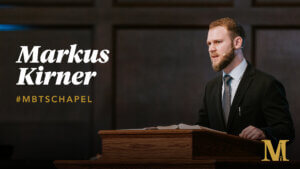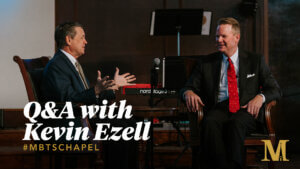KANSAS CITY, Mo—In a special chapel service, Midwestern Seminary hosted a panel on the topic of human identity and pornography. President Jason Allen led the conversation, which featured the President of the Council of Biblical Manhood and Womanhood Denny Burk alongside four Midwestern Seminary professors, J. Alan Branch, Jared C. Wilson, and T. Dale Johnson.
Framing the conversation, Allen said, “We want to have this conversation in an encouraging way—to spur others on to godliness, but also in a redemptive way—understanding that virtually every person has had an encounter with pornography, whether they wanted to or not.”
The Prevalence of Pornography
Panelists began by considering the statistics and the ever-increasing temptation of pornography in modern society, focusing on two dates in particular. As Burk said, over 50% of American households began to have broadband internet in 2007, and over 50% of American households had smartphones in 2013. These dates radically accelerated pornography usage.
Elaborating on the prevalence of pornography today, Branch shared four points that combine to make these temptations “deadly:” its availability, affordability, anonymity, and addictive nature.
Johnson went on to discuss how this growth is not only amongst both genders, but how it has created a greater sense of freedom for confession in counseling situations.
The Cause and Effects
Allen then turned the conversation toward the heart of the issue, asking panelists, “What’s wrong with pornography?” In response, panelists began at the root, stating how pornography directly violates God’s clear commands in Scripture.
Burk and Johnson spent time talking more about the root of the problem, showing audience members from Scripture how pornography corrupts God’s good creation.
After sharing from Matthew 5:27-28, Burk said, “Pornography is sinful to produce and it’s sinful to consume. This isn’t imaginary. Pornography is abusive and degrading. Its harming those involved and it’s harming you as a consumer.”
After sharing about the biblical ideal of human sexuality, panelists went on to discuss the effects of and response to pornography.
They cited biblical and statistical evidence to show how pornography leads to sexual struggles in marriages, lack of respect for women, aggression or passivity in relation to the opposite sex, delays and declines to marriage, and much more.
These effects are noticed even beyond the Christian worldview, they recognized.
Wilson said, “The wider, secular culture is beginning to wrestle with this too and they speak of pornography on the level of a public health crisis. The culture wrestles with the problems pornography creates while at the same time trying to uphold other values like a lack of any significant difference between men and women.”
“Ultimately,” Allen summarized, “pornography corrupts what God has made and leads to total destruction.”
The Solution
Wilson and Branch agreed that the solution to this great problem is the gospel of Jesus Christ. They said, “The Christian response should me more than just law (i.e. ‘do not lust’), but should press the gospel into every aspect of the issue.” Branch gave an example, stating how Jesus, not pornography, is the answer to loneliness.
Allen also asked panelists why pornography is so addictive, and panelists began by talking about Satan’s strategy to corrupt the good.
Burk talked about four purposes for which God created sex: the consummation of marriage, expression of love in marriage, the procreation of children through marriage, and the pleasure of love in marriage. As marriage is a display of the gospel to the world, he said, it is also one of Satan’s strategies to corrupt this gospel icon in the world.
Pornography makes false promises, said Wilson. “The antidote to this is that you take your eyes off this thing that’s making false promises to you, and you put your eyes on the only satisfaction, the only true beauty, and the only thing that will actually make you wise, which is the glory of Christ. Stare at the beauty of Jesus.”
Branch expounded on this idea, saying, “Pornography is something that grows in the dark and dies in the light. You need to get accountability structures in place.”
Pornography and the Local Church
Panelists also discussed its pervasiveness in the local church, sharing how pastors and ministry leaders should assume people at their churches are engaged in pornography.
Allen asked panelists to give audience members direction on how to move forward and pursue God’s design for human sexuality.
Johnson said, “It is better to not have a cell phone and get into heaven than to have a cell phone and not get into heaven. Take radical approaches and create consistent rhythms of accountability.”
Before concluding the panel, Allen gave a further encouragement to parents to guard their children’s devices and internet usage, not as a means of punishment but protection.
He then said, “We are five men who are very fallen and wrestle with the lust of the flesh like everyone else in the room. But we’re also five men who know the joys of marriage and the joys of walking with Christ. May the Lord use this conversation to strengthen you and amplify your love for Christ and amplify your holiness and your honoring of him in our lives.”
To watch the panel, visit Midwestern Seminary: A Panel Discussion on Human Identity and Pornography.


